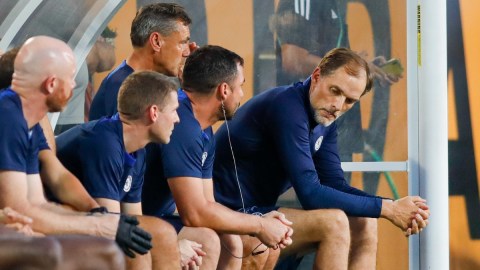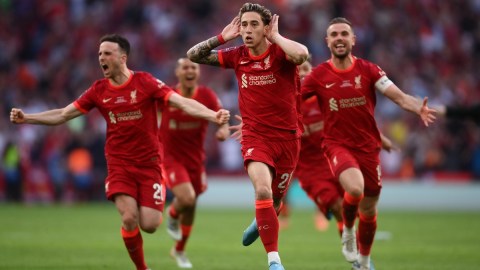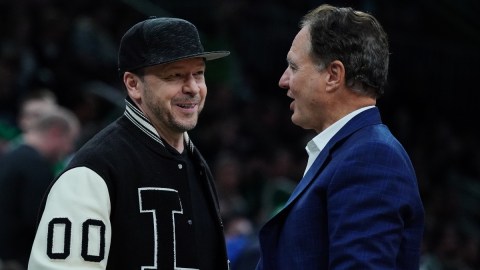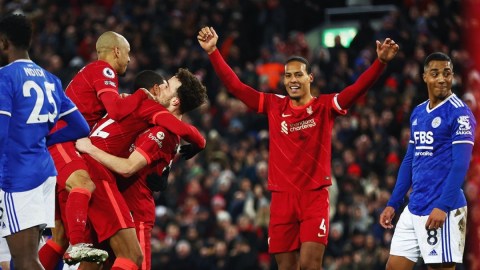 Jose Mourinho left Chelsea in 2007 and he went on a “lap around Europe.” He returned to Stamford Bridge on Monday, saying he became a “better” manager and “calmer” man during his travels.
Jose Mourinho left Chelsea in 2007 and he went on a “lap around Europe.” He returned to Stamford Bridge on Monday, saying he became a “better” manager and “calmer” man during his travels.
Mourinho’s Chelsea return mixes two classic stories. There’s a hint of the parable of the prodigal son (or prodigal “daddy” as far as Michael Essien is concerned) and a heavy dose of rekindled love — the one where two old flames reunite and try to make the second time around better than the first.
The tale of the prodigal son ends with a celebration. Like the father after the return of his long-lost son, Chelsea fans are overjoyed at Mourhino’s second coming. After all, he made Chelsea into a trophy-winning club, and it’s only natural for fans to base their wildest dreams of the Mourinho-led future on past glories. While the tale of the prodigal son ends in celebration, Mourinho’s second stint at Chelsea begins with the welcome-home party.
The larger part of Mourinho’s Chelsea story is more complicated. How often does a rekindled love affair (“the backslide” in layman’s terms) work out in the end? We don’t have the statistics on hand, but the fact that it’s always a big deal when second-time loves actually do work out should serve as the spit in the proverbial punch bowl.
In his first news conference as second-time Chelsea manager, Mourinho was adamant that he wasn’t dumped the first time around. He said he and and owner Roman Abramovich decided to part ways — by mutual consent — back then. Each thought he would be better off without the other. Almost six years have passed, and they now want and need the same thing.
“So it was a difficult decision at that time for both of us, but a decision made by mutual agreement,” Mourinho said. “Only because there was never a break of a relation, it’s possible I’m here today. It wouldn’t be possible being here if we’d had real problems, no relations. I’m back because we feel we are in a moment of my professional life — and in the case of the owner also a moment of his career as an owner — where we are probably in the best moment of our careers, and ready to work together again and with much better conditions this time to succeed and have what this club wants: which is stability.”
Having the same wants and needs is a good starting point in any relationship (new or restored), and it also helps when the timing is right. Mourinho wandered and won from 2008-13. Chelsea rode a carousel of managers as it packed the trophy case during the same period. The self-proclaimed “Happy One” says stops in Italy (Inter Milan) and Spain (Real Madrid) improved him as a manager, but he longed for something more permanent. Chelsea’s tumultuous period also taught Abramovich a valuable lesson. While his club may be able to cycle through managers and keep winning, it will never have an identity — one that fans around the world love, respect and fear — as long as the carousel spins out of control.
Mourinho is back at Chelsea to give it an identity, instilling what he calls “game principles” into the fabric of the club. It is among the loftiest goals a soccer manager can have. Europe’s leading clubs often have distinct styles of play, and the top clubs dress their perennial success in their unique styles. Mourinho’s teams, from Chelsea to Real Madrid, have his imprint: power and aggression, mixed with skill and focus. It won’t be long before Chelsea is playing what I like to call “JoseBall” again.
“It’s the job of the manager not just to focus on what you do when you’re here, but on the legacy and contribution you leave for the future,” Mourinho said. “In this moment, it’s a moment for a different approach. Not losing my nature, which is the nature of the club too — trying to win is not just my nature, but that of the club too — and Mr Abramovich too. I think we are all prepared for a different era with a different profile of team. My fingerprint has to be… a football team without the fingerprint of its manager is never a football team, even if it looks like it is. We want an identity even more present.”
Mourinho’s Chelsea contract runs until 2017, and he spoke of wanting to continue beyond then. If he achieves what he sets out to do, it would be no surprise to see him extend his stay through the end of the decade. That would see his influence at Chelsea effectively stretch from 2004 to 2019 (or beyond) — a reign which would put him in the same company as Sir Alex Ferguson at Manchester United and Arsene Wenger at Arsenal. Their presences defined eras in the history of their respective clubs.
But Mourinho will only join such exalted names if he continues to evolve and improve as a manager. Adventures at Europe’s top clubs helped him do that during his “formative” years. How he develops now that he is back home will determine the course of his second relationship with Abramovich and Chelsea. Mourinho set the standard in his first Chelsea reign. The success he and Chelsea enjoyed during their time apart only raised the expectations of Abramovich, Chelsea fans and Mourinho himself.
Winning the Premier League title is the first step. Mourinho says that could take two seasons. Challenging the likes of Bayern Munich, Borussia Dortmund and FC Barcelona for European supremacy will take longer. Real Madrid couldn’t win that coveted 10th European Cup playing “JoseBall.” Was it bad luck or did Europe’s best figure out how to beat Mourinho? Mourinho also says he must improve Chelsea’s current players, rather than sign new and expensive ones. Working without a blank check and total control (Abramovich advisor Michael Emenalo will keep his job as technical director) of transfers isn’t optimal for Mourinho, but it’s a fact of his new reality.
Mourinho inherits a talented but flawed Chelsea squad. Building it into a title contender will take something more than time. Mourinho must rely on a different set of skills than he did at Chelsea (the first time), Inter and Real Madrid. At those stops, he inherited great squads, signed star players and gave them the last push they needed to get over the finish line and become champions. While his reputation and Abramovich’s money will attract young stars in the future, he won’t have the top players of the present at his disposal when he gets to work.
Mourinho faces different circumstances and new challenges after returning to Chelsea. His and Abramovich’s wants and needs have changed over the years, but they are, in essence, the same people who split back in 2007. That combustible combination caused their relationship to crack as early as a year into Mourinho’s first Chelsea stint. Time will tell how they react when their relationship gets rocky again … and again … and again.
The 50-year-old Mourinho is happy to be home, and he intends to stay for a long time. In order to do so, he must draw strength and energy from the challenge of restoring Chelsea to glory and use it as he walks that long road toward building a legacy. That will only come through continued self improvement. How he will do it in a place where he is comfortable and surrounded by people who love him will be central to his and Chelsea’s future.
Have a question for Marcus Kwesi O’Mard? Send it to him via Twitter at @NESNsoccer, NESN Soccer’s Facebook page or send it here. He will pick a few questions to answer every week for his mailbag.



